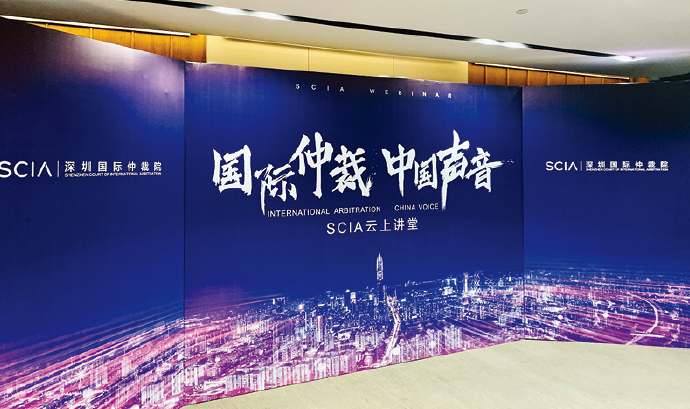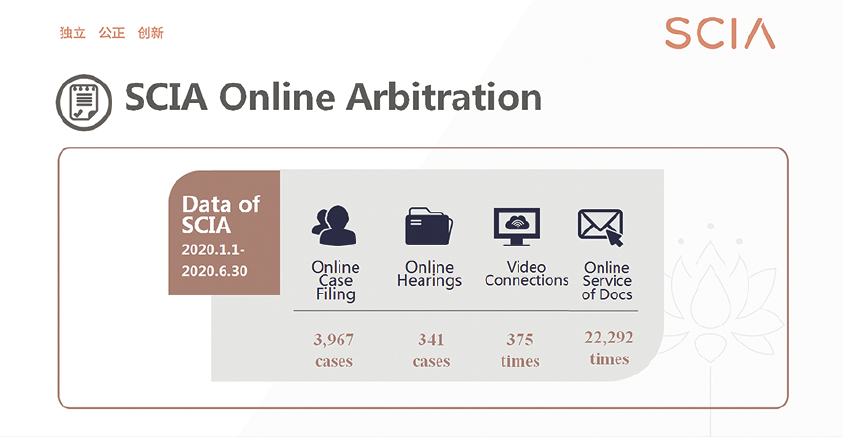Published in Asian-mena Counsel: Dispute Resolution Special Report 2020

ARBITRATION CENTRE UPDATE
Covid-19 responses by Shenzhen Court of International Arbitration.
2020 has been an extraordinary year. The worldwide outbreak of Covid-19 has thrown all aspects of the world economy and social life into disarray. It has also given rise to many legal disputes that need to be urgently resolved. For arbitration institutions in particular, how to provide effective services while keeping the outbreak under control is an unprecedented challenge. The Shenzhen Court of International Arbitration (SCIA) sees this challenge as both a test and an opportunity. As China transitions from the initial, more drastic Covid-19 responses to the current more moderate and continuing regime, SCIA has also taken steps — upgrading the case-handling system, optimising online services, reducing arbitration fees, increasing case analysis and launching a webinar series — to ensure services are not interrupted by pandemic controls. These steps have resulted in an improvement in all areas, enabling SCIA to deliver world-class, expedient, professional and fair dispute resolution services worldwide.
Technology empowering online arbitration
To facilitate social distancing and thus reduce the risk of transmission, SCIA has quickly upgraded its online platforms for case filing, remote hearing and evidence exchange and storage. These three IT platforms have enabled arbitrating parties to complete case filing, exchange of evidence, mediation and hearing through a one-stop and end-to-end contactless arbitration process, all via their mobile devices. As of June 30, a total of 3,967 cases have been filed online and 341 cases have been heard online, with 375 times of video connections created for online hearings, exchange of evidence and identity verification, 22,292 times of online service of documents. Compared with the same period last year, SCIA is seeing a doubling of the number of cases handled online. Remote hearings are effective not only in preventing the gathering of people, but also in accelerating case proceedings, benefiting both the parties and the anti-pandemic program as a whole.
Ever since pandemic control became a continuing effort, SCIA has been expanding online arbitration services, including by launching the SCIA iArbitration mini program on May 30 on WeChat, a messaging app with one billion users. Combining arbitration services with mobile technologies, this lightweight, installation-free program is powered by Tencent cloud storage, facial recognition, audio-visual synchronisation and other technologies, enabling parties to complete and track each phase of the case filing, mediation and arbitration proceedings on their phones.
According to the feedbacks of the parties, all these online services have made SCIA’s arbitration services more convenient and efficient than ever before, creating a sophisticated, smart and user-friendly platform that showcases the future of internet-based remote arbitration.

SCIA webinar series streaming online
The pandemic has also limited offline seminars that previously often held to share legal updates or opinions on tough questions which had helped inform businesses on their legal affairs. In response, SCIA is moving the discussions online with its constantly published case studies series and livestreaming webinar seminars. In respect of the former, SCIA has been organising experts to release pandemic-related case studies and articles on its official website and WeChat account, covering international trade, foreign-related landlord-tenant disputes, force majeure in international commercial contracts and other key issues, which aim to shed light on the legal issues that companies may have.
In respect of the latter, SCIA has launched its own online seminar series, the SCIA Webinar. For example, the first seminar, themed ‘Challenging Legal Issues in the Performance of Import-Export Contracts Amid the Global Pandemic’, was successfully held on June 5. During the event, experts in international trade and international commercial arbitration shared their thoughts and practical advice on risk prevention and dispute resolution, analysing such topics as the state of import and export for Chinese enterprises during the pandemic, issues in contract performance in real-world cases, contract design and legal response of foreign-trade enterprises, and the mediation and arbitration of international trade and contract disputes. SCIA is planning more seminars for the SCIA Webinar series, where invited experts will focus on prominent legal issues and answer questions from enterprises.
International experts appointed to expand the SCIA panel of arbitrators
Covid-19 has given rise to a large number of international disputes. To facilitate their resolution, SCIA has steadfastly implemented its internationalisation strategy during the pandemic, adding a further 46 internationally renowned experts to its panel of arbitrators, 12 of whom are members of the International Commercial Expert Committee (ICEC) of the Supreme People’s Court. This means that SCIA panels now boast 29 of the first 31 ICEC members recognised by the highest court of China.
SCIA is the first arbitration institution in China to appoint overseas arbitrators. Of the 15 arbitrators first hired by SCIA in 1984, eight were from Hong Kong. In fact, SCIA has become an ever more international arbitration institution over the past three-and-a-half decades, in particular in relation to its panel structure. SCIA now has 933 arbitrators representing 77 countries and regions, including 385, or over 41 percent of the total, from overseas jurisdictions — the highest percentage in China. SCIA’s highly professional and international panel of arbitrators is a major assurance to businesses that seek to resolve foreign-related commercial disputes.
______________________________
Model Arbitration Clause:
Any dispute arising from or in connection with this contract shall be submitted to the Shenzhen Court of International Arbitration (the SCIA) for arbitration.
______________________________
![]()
![]() Click Here to read the full issue of Asian-mena Counsel: Dispute Resolution Special Report 2020.
Click Here to read the full issue of Asian-mena Counsel: Dispute Resolution Special Report 2020.

